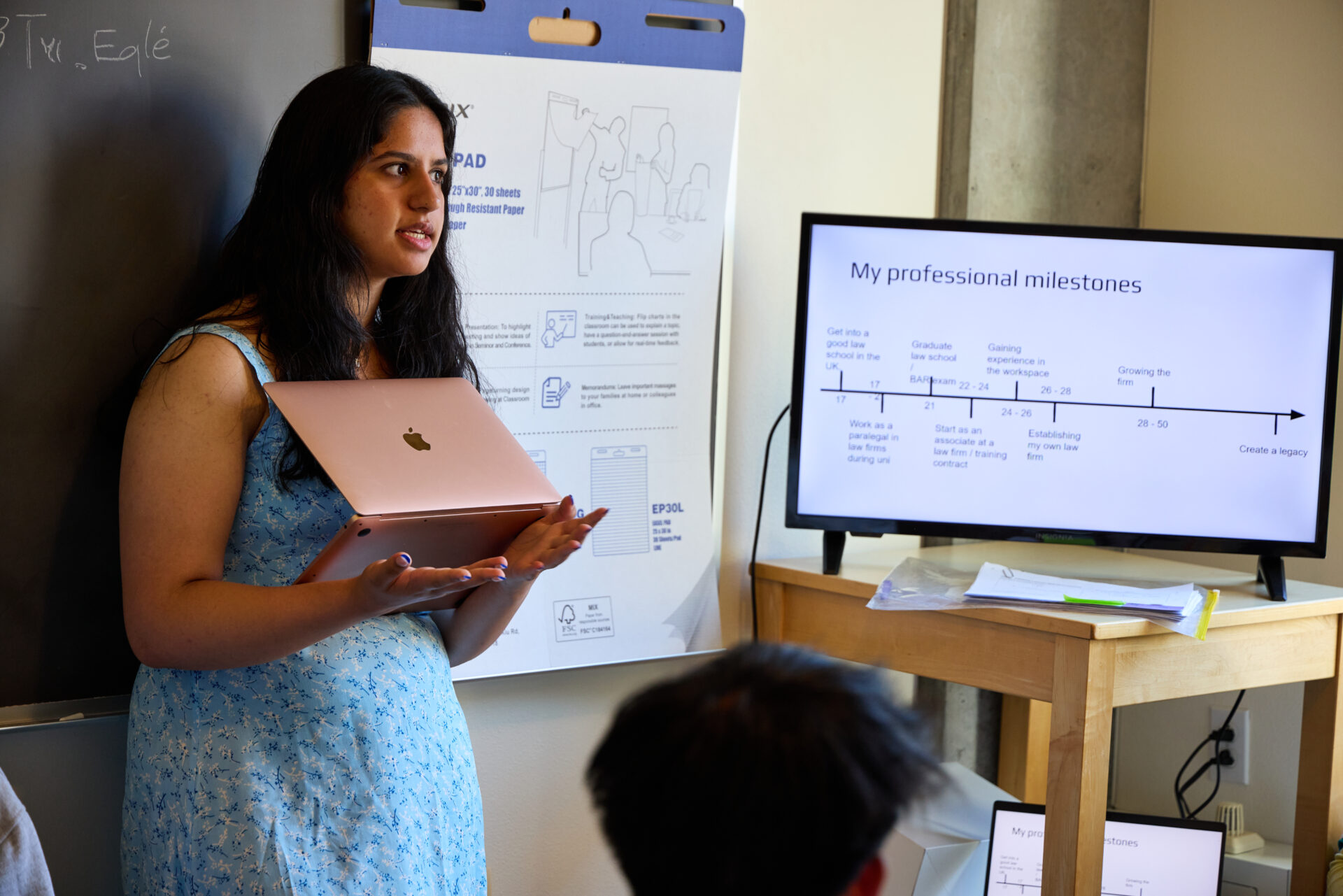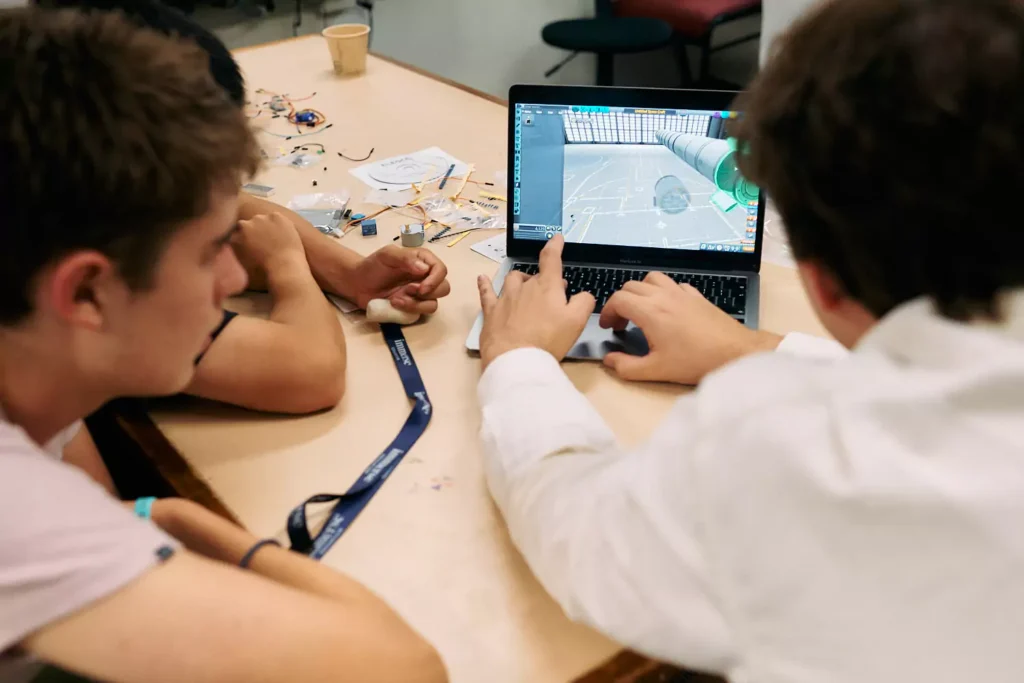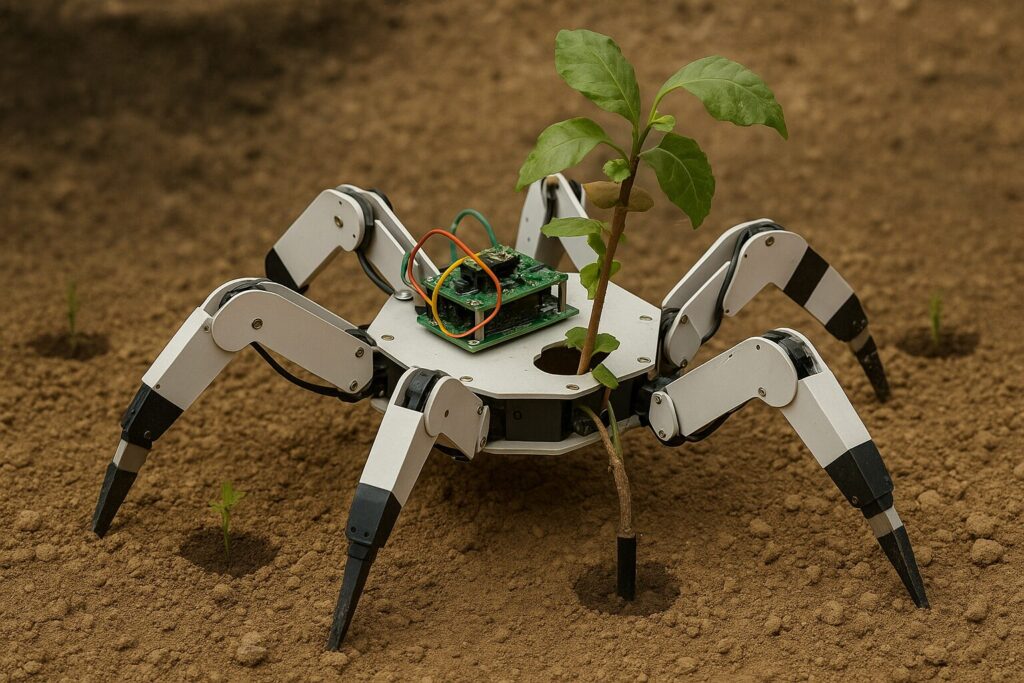Debate competitions for high school students aren’t just about speaking well – they’re about thinking fast, listening sharply, and structuring ideas under pressure. Whether you’re crafting a calm rebuttal or launching a passionate closing argument, a public speaking competition will train students to handle complex topics with logic, empathy, and persuasive clarity. Beyond the thrill of the podium, participants walk away with confidence, sharper reasoning, and a toolkit of communication skills that last a lifetime.
Many students prepare for these competitions through programs such as an online summer school, which provides opportunities to practice debate and public speaking skills in a supportive environment.
Debate formats vary widely, from British Parliamentary to Lincoln-Douglas to Model UN. Some are head-to-head, others team-based. Some focus on philosophical questions, others dissect current affairs. But all debate competitions reward critical thinking, awareness of bias, and the ability to hold your ground with precision and focus.
Participating in a prestigious program like an Oxford summer school or a Cambridge summer school can also give students a competitive edge by combining rigorous academic enrichment with debate training.
Over the past decade, international and online competitions have become more accessible, giving students from all backgrounds the chance to connect and compete. Many now blend speech with research, asking students to tackle ethical, legal or political dilemmas that reflect real-world tensions.
So, whether you’re drawn to oratory, passionate about politics, or just love a good argument, there’s a public speaking competition with your name on it – and stepping onto it could change how you think, speak, and see the world.
To explore and enter each of these debate competitions for high school students, as well as finding additional tips and competitions across many other disciplines, at succeed.immerse.education/competitions.
1. The TED Ideas Competition
Summary:
The TED Ideas Competition is a free, international public speaking challenge designed for high school participants aged 14–18 who have an idea, message, or question they want to share. Delivered by Immerse Education in partnership with TED, the challenge invites students to record a one-minute video responding to a single prompt: imagine everyone in the world is listening to you for one minute. What would you say, and why?
Unlike traditional debate or speech competitions, this challenge focuses on ideas in progress rather than polished performance. Participants are encouraged to share early thinking, personal reflections, or questions they care about, with judging centred on clarity of ideas, originality, and motivation. The competition offers selected participants the opportunity to win full or partial scholarships to attend TED Summer School, where they can further develop and confidently communicate their ideas.
Key Details:
- Format: Online video submission. Participants record and submit a one-minute video speaking directly to the camera.
- Subjects Covered: Public speaking, communication, idea development, storytelling.
- How to Enter: Submit a video link through the official online entry form. Open to individual entries worldwide.
- Prize: Full or partial scholarships to attend TED Summer School, delivered by Immerse Education in partnership with TED.
- Age Range: 14–18.
- Nationalities: International. Open to students worldwide.
Tips:
- Sample Motion: “Imagine everyone in the world is listening to you for one minute. What message or idea would you share, and why?”
- Tips for Success:
- Focus on one clear idea: One minute goes quickly. Choose a single message, question, or insight you want people to remember.
- Keep it authentic: Judges are interested in why this idea matters to you, not how polished your delivery is.
- Use a personal connection: A brief experience or observation can help explain your motivation and perspective.
- Speak naturally to the camera: Record in a quiet space with clear sound and simple lighting. No editing or special equipment is required.
- End with purpose: Leave your audience with a thought, question, or reflection that reinforces your main idea.
2. Debating Matters Competition
Summary:
Debating Matters is a UK-based competition that distinguishes itself by prioritizing substance over style, rewarding teams for the depth and clarity of their arguments rather than rhetorical flair – making it less of a public speaking competition and more a test of critical thinking, research skills, and the ability to engage with complex issues under pressure. Organized by the charity Ideas Matter, the competition challenges sixth-form students (ages 16–18) to grapple with real-world controversies that are central to public debate. Using comprehensive Topic Guides, participants are expected to research thoroughly and prepare nuanced arguments. The competition features eminent judges who rigorously question debaters, requiring them to justify and defend their positions under pressure. With a history spanning over 20 years, Debating Matters has run events across the UK, Europe, and in unique settings such as prisons, and its resources are widely used as teaching tools globally.
Key Details:
- Format: In-person regional and national rounds, with teams debating set motions, followed by intensive Q&A from judges.
- Subjects Covered: Contemporary political, social, scientific, and ethical issues (e.g., free speech, public health, technology, environment).
- How to Enter: Schools register teams; resources and event details are available online.
- Prize: Trophies, certificates, and opportunities for media coverage and further debate.
- Age Range: Sixth-form (16–18).
- Nationalities: Primarily UK, but with international and special projects.
Tips:
- Sample Motion: “Social media platforms should be held legally responsible for content posted by users.”
- Tips for Success:
- Use Topic Guides: Start with the official guides to build a strong foundation.
- Go Beyond Headlines: Delve into the complexities and underlying assumptions of each issue.
- Anticipate Judge Questions: Prepare to defend your arguments with evidence and logic under cross-examination.
- Substance Over Style: Focus on the strength and clarity of your reasoning, not just delivery.
- Practice Under Pressure: Simulate the Q&A format to build confidence and quick thinking.
3. spUN Debate Program of the National Space Society (NSS)
Summary:
spUN Debate is an international debate program run by the National Space Society, focusing on space policy, ethics, and the future of humanity beyond Earth. The program is designed to engage high school and university students in deep, interdisciplinary debates about the challenges and opportunities of space exploration and settlement. Debates often address topics like space law, resource allocation, planetary protection, and the societal impacts of space development. The competition fosters critical thinking, collaboration, and a multidisciplinary approach, drawing participants from around the world.
Key Details:
- Format: Online and in-person debates, with preliminary rounds and finals; teams research and present arguments on complex space-related motions.
- Subjects Covered: Space policy, ethics, law, science, and technology.
- How to Enter: Register online as an individual or team; open to high school and university students globally.
- Prize: Certificates, recognition by the National Space Society, and opportunities for publication or conference participation.
- Age Range: High school and university students (typically 15–22).
- Nationalities: International.
Tips:
- Sample Motion: “Private companies, not governments, should lead the settlement of Mars.”
- Tips for Success:
- Interdisciplinary Research: Combine knowledge from science, law, ethics, and policy.
- Stay Current: Follow recent developments in space exploration and commercial spaceflight.
- Engage with Experts: Seek out webinars and NSS resources to deepen your understanding.
- Think Big: Consider the long-term implications and philosophical questions of humanity’s future in space.
- Practice Articulating Complex Ideas: Be ready to explain technical concepts clearly to a general audience.
Join the Immerse Education 2025 Essay Competition
Follow the instructions to write and submit your best essay for a chance to be awarded a 100% scholarship.

4. The Historical Association’s Great Debate Competition
Summary:
The Great Debate, organized by the UK’s Historical Association, is a national public speaking competition for students aged 16–19, focusing on historical analysis and argument. Each year, a new question is posed (e.g., “Which historical change has had the biggest impact on your local area?”), and students research and present a 5-minute speech. The competition encourages critical engagement with history, the use of evidence, and the ability to connect the past with contemporary issues. Regional debate competitions lead to a national final, with participants judged on content, structure, and delivery.
Key Details:
- Format: 5-minute prepared speech, followed by judges’ questions; regional heats and national final.
- Subjects Covered: Historical topics, often with a local or contemporary relevance.
- How to Enter: Register through your school or as an individual; open to UK students.
- Prize: Trophies, certificates, and publication opportunities.
- Age Range: 16–19.
- Nationalities: UK.
Tips:
- Sample Motion: “Which historical event has most shaped your community?”
- Tips for Success:
- Research Widely: Use primary and secondary sources for a nuanced argument.
- Make it Relevant: Connect historical analysis to current issues or your own experiences.
- Structure Your Speech: Have a clear introduction, argument, evidence, and conclusion.
- Prepare for Questions: Anticipate challenges and be ready to defend your interpretation.
- Practice Delivery: Work on pacing, clarity, and engaging the audience.
5. International Public Policy Forum (IPPF) Debate Competitions
Summary:
The IPPF runs unique international debate competitions that combines written and oral advocacy, open to high school students worldwide. Sponsored by the Brewer Foundation and NYU, the IPPF begins with teams submitting written essays on a global policy resolution. Top teams advance to written exchanges and then to live oral debates, culminating in a final round in New York City. The competition emphasizes policy research, persuasive writing, and cross-examination skills, and is renowned for its rigorous, multi-stage format and generous scholarships.
Key Details:
- Format:
- Round 1: Written essays (3,000 words max) on a set resolution.
- Rounds 2–4: Written exchanges (constructive, rebuttal, and summary essays).
- Finals: Live oral debates in New York for top teams.
- Subjects Covered: International public policy, economics, human rights, environment, global security.
- How to Enter: Register online as a team (3–5 students); open internationally.
- Prize: $10,000 grand prize, finalist scholarships, and trophies.
- Age Range: High school students (typically 14–18).
- Nationalities: International.
Tips:
- Sample Motion: “Resolved: Governments should prioritize economic growth over environmental protection.”
- Tips for Success:
- Master Policy Research: Use think tank reports, academic journals, and government data.
- Develop Strong Written Advocacy: Write clear, persuasive, and well-structured essays.
- Strategize for Written Exchanges: Anticipate counterarguments and craft effective rebuttals.
- Polish Oral Delivery: If you reach finals, practice cross-examination and teamwork.
- Meet Deadlines: The multi-stage format requires careful time management.
6. Malaysian National Public Speaking Championship
Summary:
The Malaysian National Public Speaking Championship is a leading platform for Malaysian students to showcase their oratory and persuasive skills. Organized by the Malaysian Institute for Debate and Public Speaking (MIDP), the event features multiple rounds, including prepared speeches and impromptu speaking, judged by experienced adjudicators. The competition aims to foster confidence, critical thinking, and effective communication among youth.
Key Details:
- Format: Prepared speech, impromptu rounds, and finals; individual entry.
- Subjects Covered: Wide range, from current affairs to personal and societal issues.
- How to Enter: Register online; open to Malaysian students in secondary and tertiary education.
- Prize: Trophies, certificates, and national recognition.
- Age Range: Secondary and tertiary students (13–25).
- Nationalities: Malaysia.
Tips:
- Sample Motion: “The youth of today are the leaders of tomorrow.”
- Tips for Success:
- Practice Impromptu Speaking: Develop frameworks to organize thoughts quickly.
- Engage the Audience: Use stories, rhetorical questions, and strong openings.
- Work on Voice and Body Language: Clarity, projection, and confident posture matter.
- Seek Feedback: Record yourself and ask for constructive critique.
- Stay Informed: Read widely to be ready for diverse topics.
7. National History Day (USA)
Summary:
National History Day (NHD) is a nationwide academic program and competition in the United States that encourages students to conduct original historical research and present their findings through papers, exhibits, performances, documentaries, or websites. While not strictly a debate, this is certainly a public speaking competition, with many categories involving defending interpretations and engaging in Q&A with judges. NHD fosters critical thinking, research, and presentation skills, and is recognized as a prestigious achievement for U.S. students.
Key Details:
- Format: Regional, state, and national rounds; multiple presentation formats; interviews with judges.
- Subjects Covered: Any historical topic related to the annual theme (e.g., “Turning Points in History”).
- How to Enter: Schools register students; open to grades 6–12.
- Prize: Medals, certificates, scholarships, and national recognition.
- Age Range: Grades 6–12 (typically 11–18).
- Nationalities: USA.
Tips:
- Sample Motion: “Defend your thesis on the impact of the Civil Rights Movement.”
- Tips for Success:
- Choose a Compelling Topic: Pick something you’re passionate about and that fits the theme.
- Conduct Original Research: Use primary sources and document your process.
- Prepare for Interviews: Be ready to defend your conclusions and explain your research choices.
- Polish Your Presentation: Whether a paper or exhibit, clarity and professionalism count.
- Meet Deadlines: NHD projects require sustained effort over months.
More interested in STEM? We’ve listed the top 60 STEM competitions for high schoolers here.
8. UK Youth Parliament Debate Competitions
Summary:
The UK Youth Parliament hosts annual debate competitions at the House of Commons, giving young people a platform to discuss and influence national policy. Members aged 11–18 are elected from across the UK and debate motions on issues affecting young people, from mental health to education reform. Debates are chaired by the Speaker of the House and broadcast nationally, providing a unique, high-profile experience.
Key Details:
- Format: Formal parliamentary debates, with speeches, questions, and voting.
- Subjects Covered: Current affairs, youth policy, social issues.
- How to Enter: Stand for election as a Member of Youth Parliament (MYP) or participate in regional debates.
- Prize: National recognition, media coverage, and policy influence.
- Age Range: 11–18.
- Nationalities: UK.
Tips:
- Sample Motion: “Should the voting age be lowered to 16?”
- Tips for Success:
- Understand Parliamentary Procedure: Learn the rules and etiquette of formal debate.
- Engage Constituents: Represent the views of your peers authentically.
- Speak with Authority: Use evidence and personal stories to persuade.
- Network: Build alliances with other MYPs for greater impact.
9. National Speech and Debate Tournament / National Speech and Debate Association National Tournament
Summary:
The NSDA National Tournament is the largest academic competition in the world, bringing together thousands of U.S. high school students for events in debate, public speaking, and interpretation. Events include Policy Debate, Lincoln-Douglas Debate, Public Forum, Congressional Debate, Extemporaneous Speaking, and more. The tournament is the culmination of a year-long circuit and is highly competitive, with scholarships and national titles on the line.
Key Details:
- Format: Multiple debate and speech events, preliminary and elimination rounds, live and online components.
- Subjects Covered: Policy, philosophy, current events, literature, and more.
- How to Enter: Qualify through district and state tournaments; open to NSDA members.
- Prize: National titles, scholarships, trophies, and recognition.
- Age Range: Middle and high school students (typically 12–18).
- Nationalities: USA.
Tips:
- Sample Motion: “Resolved: The United States federal government should substantially increase its investment in renewable energy.”
- Tips for Success:
- Master Your Event: Understand the rules and judging criteria for your chosen format.
- Practice Extensively: Rehearse speeches, cross-examination, and rebuttals.
- Keep Evidence Organized: Use digital or physical tubs for quick access during rounds.
- Adapt to Feedback: Review ballots and judge comments to improve round by round.
- Network and Learn: Watch top competitors and attend workshops.
10. World Schools Debating Championships (WSDC)
Summary:
WSDC is the most prestigious international English-language public speaking competition for secondary students, with teams from over 60 countries. The tournament uses the World Schools format, combining prepared and impromptu motions, and emphasizes teamwork, logical argumentation, and global awareness. These debate competitions are judged by panels of experienced adjudicators, and the competition is renowned for its high level of discourse and international camaraderie.
Key Details:
- Format: Teams of 3–5, with both prepared and impromptu debates; preliminary rounds and knockouts.
- Subjects Covered: Global issues—politics, economics, ethics, science, social justice.
- How to Enter: National teams are selected through trials; open to secondary students worldwide.
- Prize: World champion title, trophies, and international recognition.
- Age Range: Secondary students (typically 14–19).
- Nationalities: 60+ countries.
Tips:
- Sample Motion: “This House would ban the use of facial recognition technology by governments.”
- Tips for Success:
- Master the Format: Learn the structure—substantive speeches, replies, and points of information.
- Build Team Chemistry: Coordinate arguments and support each other during rounds.
- Practice Impromptu Debating: Develop frameworks for quickly organizing arguments.
- Engage with Global Issues: Read widely and understand different cultural perspectives.
- Seek Feedback: Use adjudicator comments to refine strategy and delivery.
If you’re ready to test your voice and sharpen your thinking, this is just the beginning. You’ll find dozens more debate competitions for high school students — from local heats to global finals — over at succeed.immerse.education/competitions. Whether you’re a seasoned speaker or just curious to try, there’s a stage waiting for you.


























